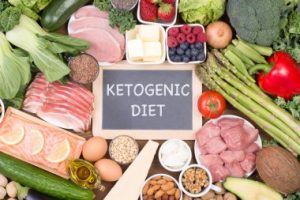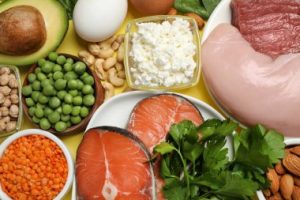
Can You Gain Muscle On Keto Without Exercise (9 Important Facts)
Can you gain muscle on keto without exercise through strict dietary adherence and optimized protein intake Achieving muscle gain on a ketogenic diet without exercise is a topic of intrigue for many individuals seeking to optimize their body composition. While exercise is traditionally seen as essential for building muscle, some wonder if dietary changes alone, such as adopting a ketogenic lifestyle, can yield similar results.
Let’s delve into this intriguing subject to understand its feasibility and implications. In the ever-evolving realm of fitness and nutrition, the ketogenic diet has carved its niche as a powerhouse for weight loss and metabolic transformation. But here’s a thought that might raise eyebrows: can you truly sculpt muscle on a high-fat, low-carb regimen without breaking a sweat in the gym? It’s the ultimate conundrum for fitness enthusiasts and skeptics alike.
Imagine a scenario where the traditional paradigm of grueling workouts takes a backseat, and instead, the kitchen becomes your primary arena for muscle growth. Welcome to the intriguing world where the ketogenic diet challenges conventional wisdom, offering a tantalizing proposition: the possibility of gaining muscle sans the typical gym grind. Let’s delve into this captivating frontier where nutrition meets hypertrophy, and explore the tantalizing potential of building muscle on keto without traditional exercise.

Can You Gain Muscle On Keto Without Exercise
Yes, it’s possible to gain muscle on a keto diet without exercise, though it’s less efficient than with exercise.
Keto Diet and Muscle Gain
The ketogenic diet, characterized by low carb intake, moderate protein, and high fat consumption, is primarily known for its effectiveness in weight loss and improving metabolic health. However, its potential for muscle gain without exercise is a subject of debate among fitness enthusiasts and researchers.
Role of Protein Intake
Protein intake is crucial for muscle growth and repair. On a keto diet, adequate protein consumption becomes even more critical, as the body relies on protein as a primary source of amino acids for maintaining muscle mass.
Ketosis and Muscle Preservation
Entering a state of ketosis, where the body utilizes fat for energy instead of carbohydrates, may have implications for muscle preservation. Some research suggests that ketones spare muscle breakdown, potentially aiding in muscle retention or even modest gain in the absence of exercise.
Optimizing Nutrient Timing and Quality
For those aiming to gain muscle on keto without exercise, optimizing nutrient timing and quality becomes paramount. Consuming protein-rich meals spread throughout the day, including essential amino acids, can support muscle protein synthesis and overall muscle health.
Understanding the Ketogenic Diet
Understanding Ketosis in the Ketogenic Diet
Ketosis is a metabolic state where the body burns fat for fuel instead of carbohydrates, leading to the production of ketones. In the ketogenic diet, achieving and maintaining ketosis is central for weight loss and improved health. Ketosis is facilitated by severely restricting carbohydrate intake, typically to 20-50 grams per day. It plays a crucial role in fat loss, energy production, and mental clarity.
Macronutrient Composition of the Ketogenic Diet
The ketogenic diet is characterized by a high fat, moderate protein, and very low carbohydrate intake. Typically, it consists of 70-80% of calories from fat, 20-25% from protein, and 5-10% from carbohydrates. This macronutrient ratio is designed to induce and maintain ketosis, the hallmark of the ketogenic diet.
Benefits and Drawbacks of Ketogenic Diet for Muscle Gain
While the ketogenic diet is primarily known for its efficacy in weight loss and managing certain health conditions, its impact on muscle gain is debated. Some argue that the ketogenic diet may hinder muscle gain due to the limited availability of carbohydrates for energy during intense workouts. However, proponents suggest that the ketogenic diet can preserve muscle mass while promoting fat loss. Nonetheless, individual responses vary, and it’s essential to consider personal goals and preferences when adopting this dietary approach.

Mechanisms of Muscle Growth
Overview of muscle hypertrophy
Muscle hypertrophy, commonly referred to as muscle growth, involves an increase in the size of muscle cells. This process occurs primarily through two mechanisms: myofibrillar hypertrophy which involves an increase in the size and number of myofibrils within muscle fibers, and sarcoplasmic hypertrophy, which involves an increase in the volume of the sarcoplasmic fluid surrounding the myofibrils. Achieving muscle hypertrophy is a primary goal for many individuals engaged in strength training and bodybuilding.
Role of protein synthesis and breakdown in muscle growth
Protein synthesis and breakdown play pivotal roles in muscle growth. Protein synthesis involves the creation of new proteins within muscle cells, while protein breakdown involves the degradation of existing proteins. Muscle growth occurs when protein synthesis exceeds protein breakdown, resulting in a net increase in muscle protein content. Essential amino acids, obtained through diet or supplementation, are critical for stimulating protein synthesis and promoting muscle growth.
Impact of resistance training on muscle hypertrophy
Resistance training, also known as strength training or weightlifting, is a highly effective method for stimulating muscle hypertrophy. By subjecting muscles to resistance or load, such as weights or resistance bands, resistance training induces muscle damage and triggers the body’s adaptive response mechanisms, leading to muscle repair and growth. Progressive overload, where the intensity or volume of resistance training is gradually increased over time, is key to maximizing muscle hypertrophy through resistance training.

Factors influencing muscle growth beyond exercise
Several factors beyond exercise influence muscle growth, including nutrition, rest, hormones, genetics, and age. Adequate nutrition, particularly sufficient protein intake, is essential for providing the building blocks necessary for muscle repair and growth. Quality sleep and proper rest are crucial for facilitating muscle recovery and adaptation. Hormones such as testosterone, growth hormone, and insulin-like growth factor play significant roles in regulating muscle growth processes. Additionally, genetic factors influence individual differences in muscle growth potential, while age-related changes in hormone levels and cellular processes can affect the rate of muscle growth.
Protein Intake on the Ketogenic Diet
Importance of protein in muscle maintenance and growth
Protein plays a vital role in maintaining and building muscle mass on the ketogenic diet. It provides essential amino acids necessary for repairing and growing muscle tissue. Adequate protein intake supports muscle maintenance during ketosis, preventing muscle loss.
Recommended protein intake on the ketogenic diet
The recommended protein intake on the ketogenic diet typically ranges from 0.6 to 1.0 grams of protein per pound of lean body mass. This helps maintain muscle mass while promoting fat loss and ketosis.
Sources of high-quality protein on keto
High-quality protein sources on the ketogenic diet include lean meats like chicken, turkey, and beef, as well as fatty fish like salmon and sardines. Eggs, dairy products like cheese and Greek yogurt, and plant-based options such as tofu and tempeh are also excellent sources.
Impact of protein intake on muscle growth without exercise
Adequate protein intake can support muscle growth even without exercise by providing essential building blocks for muscle tissue. However, combining protein intake with resistance training yields optimal results, promoting muscle protein synthesis and overall strength gains.
Ketosis and Muscle Preservation
Ketogenic Diet’s Potential Role in Preserving Muscle Mass
The ketogenic diet, known for its low-carb and high-fat approach, is increasingly recognized for its potential in muscle preservation. By minimizing carbohydrate intake, the body shifts into a state of ketosis, prompting it to rely on fat for fuel instead of glucose. This metabolic state encourages the preservation of muscle mass, crucial for maintaining strength and function. The high intake of protein in ketogenic diets also supports muscle preservation, aiding in repair and growth. It is suggested that ketones produced during ketosis may have an anabolic effect, further safeguarding muscle tissue from breakdown.
Influence of Ketones on Muscle Protein Synthesis and Breakdown
Ketones, produced during ketosis, play a significant role in regulating muscle protein synthesis and breakdown. They act as alternative energy sources, sparing muscle glycogen and reducing the need for gluconeogenesis, a process where the body converts non-carbohydrate sources into glucose. This preservation of muscle glycogen may help prevent muscle breakdown during periods of low carbohydrate availability. Additionally, ketones have been shown to stimulate muscle protein synthesis, promoting muscle growth and repair even in the absence of high carbohydrate intake.
Research Studies and Evidence Supporting Muscle Preservation on Keto
Numerous research studies provide compelling evidence supporting the muscle preservation effects of ketogenic diets. Studies have shown that individuals following a ketogenic diet can maintain or even increase lean body mass while reducing body fat percentage. Additionally, research indicates that ketogenic diets may be particularly beneficial for preserving muscle mass during weight loss or calorie restriction. Furthermore, athletes and fitness enthusiasts adopting ketogenic diets have reported improvements in muscle strength and performance, further highlighting the potential muscle-preserving benefits of this dietary approach.
Nutrient Timing and Muscle Gain on Keto
Timing of protein intake for muscle growth
When aiming for muscle gain on the ketogenic diet, the timing of protein intake plays a crucial role. To maximize muscle protein synthesis, consuming protein-rich meals around workouts is vital. This ensures a steady supply of amino acids to support muscle repair and growth. Optimal timing involves consuming protein before and after resistance training sessions. This practice enhances muscle recovery and adaptation, promoting gains in strength and size. Additionally, spreading protein intake evenly throughout the day maintains a sustained anabolic environment, aiding in muscle preservation and growth.
Strategies for optimizing nutrient timing on the ketogenic diet
Achieving muscle gain on a ketogenic diet requires strategic nutrient timing. Prioritizing pre- and post-workout meals rich in protein and healthy fats can enhance muscle protein synthesis and recovery. Incorporating nutrient-dense foods such as lean meats, eggs, and nuts into meals supports muscle growth while maintaining ketosis. Timing meals to align with workouts helps replenish glycogen stores and facilitates muscle repair. Furthermore, periodic carbohydrate refeeds can provide anabolic benefits without compromising ketosis, supporting long-term muscle development.
Importance of meal frequency and composition for muscle gain
When pursuing muscle gain, meal frequency and composition hold significant importance on the ketogenic diet. Consuming meals rich in protein, healthy fats, and low in carbohydrates supports muscle growth while sustaining ketosis. Distributing protein intake evenly across meals optimizes muscle protein synthesis throughout the day. Additionally, spacing meals strategically, such as consuming larger meals post-workout, aids in muscle recovery and adaptation. Balancing macronutrients in each meal ensures adequate energy for workouts while promoting muscle preservation and growth.

Hormonal Influence on Muscle Growth
Hormonal Influence on Muscle Growth
When it comes to muscle growth, hormones play a pivotal role. Insulin, often associated with blood sugar regulation, also stimulates muscle growth by facilitating the uptake of glucose and amino acids into muscle cells. Conversely, cortisol, a stress hormone, can inhibit muscle growth by promoting protein breakdown and inhibiting protein synthesis. Testosterone, primarily known as a male sex hormone, is crucial for muscle growth as it enhances protein synthesis, increases muscle mass, and boosts strength. These hormones, when in balance, contribute to optimal muscle development.
Ketogenic Diet and Hormonal Balance
The ketogenic diet, characterized by low carbohydrate intake and high fat consumption, can influence hormonal balance. This diet promotes ketosis, a metabolic state where the body burns fat for fuel instead of carbohydrates. This shift in fuel source affects hormone levels, including insulin and glucagon, which regulate blood sugar levels. Additionally, the ketogenic diet may impact levels of leptin and ghrelin, hormones involved in appetite regulation. Maintaining hormonal balance is essential for overall health and can influence muscle growth.
Hormonal Changes on Keto and Muscle Growth
On a ketogenic diet, hormonal changes may affect muscle growth even without exercise. Reduced insulin levels, typical of a ketogenic diet, can enhance fat metabolism and promote ketone production. However, low insulin levels may also decrease muscle protein synthesis, potentially affecting muscle growth. Additionally, elevated cortisol levels, often seen in response to stress or carbohydrate restriction, can lead to muscle breakdown. Therefore, while the ketogenic diet may offer benefits for weight loss and metabolic health, its impact on muscle growth without exercise requires careful consideration of hormonal fluctuations.
Nutritional Supplements for Muscle Growth on Keto
Overview of supplements commonly used for muscle gain
When pursuing muscle growth on a ketogenic diet, individuals often seek supplements to enhance their progress. These supplements commonly include protein powders, creatine, branched-chain amino acids (BCAAs), and beta-alanine. Protein powders provide essential amino acids crucial for muscle repair and growth, while creatine aids in energy production during high-intensity workouts. BCAAs are known for their role in muscle protein synthesis, and beta-alanine helps buffer acid buildup in muscles during exercise.
Ketogenic-friendly supplements that may support muscle growth
On a keto diet, certain supplements align well with the macronutrient ratios and metabolic state conducive to muscle growth. Medium-chain triglyceride (MCT) oil and exogenous ketones are popular choices, as they provide readily available energy sources that complement the ketogenic lifestyle. Additionally, electrolytes such as magnesium, potassium, and sodium are essential for maintaining hydration and muscle function, especially during the initial phases of keto adaptation.
Considerations and limitations of using supplements for muscle gain on keto
While supplements can be beneficial for muscle growth on a ketogenic diet, it’s important to consider potential limitations and individual needs. Some individuals may experience digestive discomfort with certain supplements, such as MCT oil, particularly when first introducing them into their diet. Moreover, excessive reliance on supplements may detract from the importance of whole foods in providing essential nutrients and micronutrients for overall health and muscle growth. It’s crucial to prioritize a well-rounded ketogenic diet and consider supplements as enhancers rather than substitutes for proper nutrition and training.
Challenges and Limitations
Potential challenges of gaining muscle on keto without exercise
When attempting to build muscle on a ketogenic diet without exercise, individuals may face hurdles such as inadequate protein intake and insufficient calorie consumption. It’s crucial to understand that muscle growth typically requires resistance training to stimulate muscle fibers. Without exercise, the body may struggle to utilize dietary protein efficiently for muscle synthesis, potentially leading to minimal gains.
Additionally, maintaining a state of ketosis while consuming enough calories to support muscle growth can be challenging, as excessive protein intake may disrupt ketosis. Overcoming these challenges may require careful planning and consideration of alternative dietary approaches to support muscle development on a ketogenic diet.
Addressing misconceptions and common pitfalls
Misconceptions surrounding muscle growth on a ketogenic diet without exercise often center on the belief that dietary adjustments alone can yield significant results. However, overlooking the importance of resistance training can lead to disappointment and frustration. Moreover, some individuals may fall into common pitfalls such as relying solely on high-fat foods while neglecting protein-rich sources necessary for muscle repair and growth. It’s essential to debunk these myths and emphasize the complementary role of exercise in achieving optimal muscle development on a ketogenic diet.
Strategies for overcoming obstacles and maximizing muscle growth potential
To maximize muscle growth potential on a ketogenic diet without exercise, individuals can implement strategies such as prioritizing protein intake, incorporating targeted resistance training, and carefully monitoring calorie consumption. Emphasizing protein-rich foods like lean meats, fish, and dairy products can support muscle repair and growth.
Additionally, incorporating high-intensity interval training (HIIT) or bodyweight exercises can help maintain muscle mass and improve metabolic health. Monitoring ketone levels and adjusting macronutrient ratios accordingly can also optimize performance and facilitate muscle development on a ketogenic diet.
Frequently Asked Questions about Can You Gain Muscle On Keto Without Exercise
Q: Can you gain muscle on a ketogenic diet without exercising?
A: While a ketogenic diet can support muscle maintenance, significant muscle growth typically requires exercise.
Q: How does a ketogenic diet affect muscle growth without exercise?
A: The high protein content in a keto diet can help maintain existing muscle mass, but without exercise, significant muscle growth is unlikely.
Q: Can keto alone build muscle mass?
A: Keto alone may not be sufficient for substantial muscle growth. Exercise, particularly resistance training, is crucial for stimulating muscle growth.
Q: What role does protein intake play in building muscle on keto without exercise?
A: Adequate protein intake is essential for muscle maintenance on a ketogenic diet. However, without exercise, excessive protein intake may not lead to significant muscle growth.
Q: Are there any supplements that can help build muscle on keto without exercise?
A: While some supplements may support muscle maintenance, they are not a substitute for exercise when it comes to significant muscle growth.
Q: Can genetics play a role in gaining muscle on keto without exercise?
A: Genetics can influence muscle growth to some extent, but exercise remains the primary factor for muscle development.
Q: What are the potential drawbacks of attempting to gain muscle on keto without exercise?
A: Without exercise, individuals may experience slower muscle growth, reduced strength, and increased risk of muscle loss over time.
Q: Is it possible to maintain muscle mass on keto without exercise?
A: Yes, a well-formulated ketogenic diet with adequate protein intake can help maintain existing muscle mass, especially when combined with a sedentary lifestyle.
Q: How can someone optimize muscle growth on keto without exercise?
A: While exercise is the most effective way to stimulate muscle growth, individuals can optimize their diet by focusing on adequate protein intake, proper hydration, and sufficient rest.
Q: Can keto help with weight loss even if muscle growth isn’t the primary goal?
A: Yes, a ketogenic diet can promote weight loss by reducing carbohydrate intake and encouraging fat metabolism, even without significant muscle growth.
Conclusion
In conclusion, while it is theoretically possible to gain muscle on a ketogenic diet without exercise due to the diet’s potential to promote muscle protein synthesis and fat loss, the effectiveness of this approach is limited. Exercise remains a crucial component in muscle growth, as it stimulates muscle protein synthesis, enhances nutrient partitioning, and improves overall body composition.
Additionally, incorporating resistance training alongside a well-formulated ketogenic diet can optimize muscle growth, strength, and performance. Therefore, while diet plays a significant role in achieving fitness goals, exercise remains indispensable for maximizing muscle gain and overall health on a ketogenic diet.